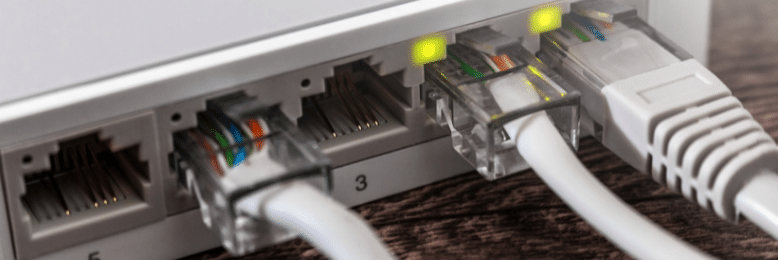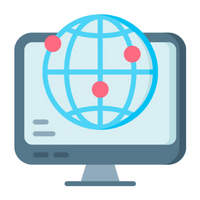Why Get Backup Internet? (& How it Affects Your VoIP)
August 5th, 2021 | 4 min. read

Not sure if backup internet is worth it? Wondering how your internet affects your VoIP? Read this article and figure out if you really need a secondary internet connection, and what factors you need to consider when getting VoIP.
In this day and age, excellent customer service is a necessity to keep a business thriving. The constant pop of multiple companies means that if there’s something about your business the customer doesn’t like, it’s easy to find another business that does what you do. But with the fast-paced tech race and the proliferation of popular social media websites, keeping customer service to a standardized line of excellence is difficult.
Customers’ expectations for fast communication have risen because of these websites that promote instantaneous communication. You could miss out on leads and sales because of inefficient communication lines and customer waiting times.
That’s the reason why multiple businesses have changed to VoIP - it just makes sense. It helps manage your communication systems without the limitations of a traditional PBX (Private Branch Exchange).
But with the transition to VoIP comes the challenges of managing this system. ITS, a Managed-IT Service Provider, has helped clients set up VoIPs for their businesses and helped improve their communication lines both with the customers and within the organization.

By the end of this article, you’ll be able to answer the following questions we’ve heard from our clients before:
- What is VoIP?
- Why is my internet connection crucial for my VoIP?
- Why and how do I choose a backup internet provider?
What is VoIP?
A Voice Over Internet Protocol (VoIP) system is mainly a system that involves turning your voice into a digital signal that the system sends over the internet. This can be done in most common messaging applications like Facebook Messenger, Viber, and Skype. It’s hard to imagine a time where VoIP didn’t exist - but it’s a relatively new technology that only got started in the late 1990s.
It essentially replaces the traditional PBX for landline phones - if you’ve ever heard an automated voice when you called or have been transferred to another line, you’ve used this conventional switchboard system. VoIP takes this technology and digitizes it, allowing these switchboards to be digital, freeing company space and resources.
Depending on the company you use to set up your VoIP, you can get multiple features. You can send text messages to numbers, keep track of voicemail messages, or call people around the world - all at a lower price.
There are a lot of steps you need in setting up VoIP. But here is the most critical factor you need to take into consideration before you set it up.
Related article: Why Switch to VoIP? A Complete Guide
The Crucial Piece of a VoIP Phone System: Your Internet

Your internet connection is the lifeline of your VoIP. You need to know what kind of internet connection you have, as well as the speed and bandwidth capacity. An unstable internet connection means that you have an unstable business connection, affecting how your business runs.
Your customers won’t be able to reach out to you if you lose your internet connection while you’re on a VoIP system. You need to be able to answer these questions before transitioning to a VoIP system:
- What will an internet cut affect your business?
- What’s your backup plan in place for possibly losing your internet connection?
- Do you have the equipment and people ready to implement this plan?
While answering those questions, you might realize that you don’t have the necessary equipment and people to manage your VoIP in the event of a system shutdown. You might want to approach a dedicated MSP about it but might not have the time right now.
That’s alright! You can already lay the foundations of a backup plan for your VoIP by making sure you have a secondary internet connection. Having a backup internet connection also allows you to keep your VoIP in peak condition, and the following sections will answer what exactly we recommend for your secondary internet connection.
Why do I need a secondary internet connection?

You might wince at paying for another internet connection, true. But you’ll also wince a lot more if you lose out on sales and leads.
A backup internet connection is recommended because businesses can’t afford to be disconnected from their customers. By the very nature of VoIP, it needs a stable internet connection to work correctly. The backup internet is for the reassurance that you won’t lose out on urgent conversations.
Also, having a backup network for your business ensures that your primary internet connection isn’t bogged down with data usage from your VoIP. The faster the internet, the better.
This backup internet is where you should connect your VoIP to so that you can keep the bulk of your internet use out of your VoIP. That way, it won’t accidentally slow down your system, and they won’t leach off one another.
How do I choose a secondary internet connection?
Here are two essential factors to consider when getting a backup connection.
- The internet provider you have.
- The internet speed and bandwidth you need.
Your Internet Provider
 When choosing a backup internet line, recall which company you bought your internet plan from. Then do not get a plan from your provider. Find somebody else, or make your Managed Service Provider find another one for you.
When choosing a backup internet line, recall which company you bought your internet plan from. Then do not get a plan from your provider. Find somebody else, or make your Managed Service Provider find another one for you.
Remember, if your provider’s internet lines go down, it’ll take all the plans you bought from them down with it. Getting internet from the same provider defeats the entire purpose of a backup connection. You need to get an internet line from another provider, as the chances of both providers going down at the same time are minimal.
Your Internet Speed & Bandwidth
 Your internet speed focuses on how fast data gets transferred to your devices, while your bandwidth determines how much you can transfer data. Make sure you consider both factors when getting your backup internet.
Your internet speed focuses on how fast data gets transferred to your devices, while your bandwidth determines how much you can transfer data. Make sure you consider both factors when getting your backup internet.
At ITS, for a solely VoIP-dedicated internet connection, we recommend that you get a connection with at least 20 Mbps download and 10 Mbps upload speed. Any slower than that, and you’ll have problems with the number of calls you can take and send without lag.
What else do I need to know about VoIP?
Here in this article, you were able to learn precisely what VoIP is, why the internet is crucial in its implementation, and what the recommended standard for your backup internet is. But that might not be enough when figuring out if VoIP is right for you.
After all, you want to make sure you get the most value out of your money and time. You also want your communications system and customer service to stay (or become) better than your competitors.
You can continue your research about the benefits of cloud-based VoIP. Plus, if you want a more thorough explanation, you can take a look at the complete list of VoIP benefits ITS has compiled into a downloadable eBook, based on our dealings with clients who’ve had the same concerns as you.
Kharmela Mindanao is a senior content writer for Intelligent Technical Solutions. She’s called Ella by her friends and likes yoga, literature, and mountain climbing. Her favorite book is Anxious People by Fredrik Backman. She creates art and poetry and is on a quest to find the best cheesecake.
Topics:
